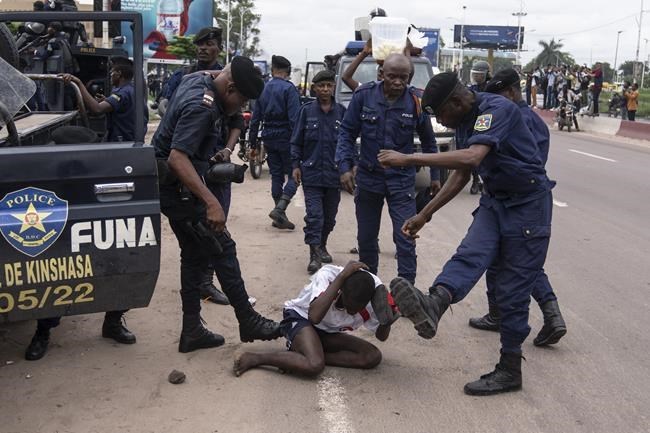
Security forces assault a supporter of presidential candidate Martin Fayulu during clashes outside his party's headquarters, in Kinshasa, Democratic Republic of the Congo, Wednesday, Dec. 27, 2023. (AP Photo/Mosa'ab Elshamy)
Republished December 31, 2023 - 8:29 AM
Original Publication Date December 31, 2023 - 7:36 AM
KINSHASA, Congo (AP) — Congo's President Felix Tshisekedi has won reelection with more than 70% of the vote, the country's election commission said Sunday as opposition candidates and their supporters questioned the validity of the results.
The preliminary results of the Dec. 20 election were announced in the capital, Kinshasa, amid demands from the opposition and some civil society groups for the vote to be rerun due to massive logistical problems that they said had undermined the balloting.
Tshisekedi's overwhelming declared victory was likely to fuel those concerns. The second-place candidate was businessman Moise Katumbi, who received 18% of the vote, and Martin Fayulu, who received 5%, finished third. Nobel Peace Prize winner Denis Mukwege, a physician renowned for treating women brutalized by sexual violence in eastern Congo, got less than 1%.
Speaking from his headquarters in the capital after the results were announced, Tshisekedi thanked his supporters for giving him another five-year term.
“You believed in my commitment so that our country can find its place in the concert of nations,” he said. “You have embraced my vision of society. I will spare no effort for more jobs, more purchasing power, more access to basic services at all levels.”
About 18 million people voted in the election, which had a turnout of more than a 40%, according to the election commission. The results will be sent to the constitutional court for confirmation, election chief Denis Kadima said.
Candidates opposing the results have two days to submit their claims, and the constitutional court then has seven days to decide. The final results are expected on January 10, and the president is scheduled to be sworn in at the end of that month.
Congo has a history of disputed elections that can turn violent, and there’s little confidence among many Congolese in the country’s institutions. Before the results were announced Sunday, opposition candidates, including Katumbi, said they rejected the results and called on the population to mobilize.
The logistical problems included many polling stations being late in opening or not opening at all. Some lacked materials, and many voter cards had smudged ink that made them illegible.
Voting in the election had to be extended into a second day— something local observers and civil society organizations have called illegal — and parts of the country were still casting ballots five days after election day.
“If a foreign country considers these elections to be elections, there’s a problem,” Fayulu said at a news conference in the capital Sunday before the results were announced. “It’s a farce, don’t accept (the results).”
Violence was already flaring in parts of the country before the results were announced. In the eastern city of Goma, youth barricaded some main streets demanding a revote. Earlier this week, clashes erupted between some of Fayulu’s supporters and police officers who fired tear gas at protesters who threw rocks and barricaded themselves inside the opposition headquarters.
“These elections are an example of fraud and ballot-box stuffing, flouting any transparent and credible electoral process and, moreover, democracy,” said Bienvenu Matumo, a member of LUCHA, a local rights group.
Leading up to and during the vote, the election commission was accused of not being transparent enough. The East African Community said its election observer mission was not granted access to Congo, and the European Union canceled its mission after authorities did not authorize the use of satellite equipment by EU monitors.
Congo analysts say the thousands of observers that were in the country were unable to say whether the irregularities had an impact on the overall integrity of the results, leaving it to the election commission.
Tshisekedi already has spent much of his time in office trying to gain legitimacy after a disputed 2018 election that some observers said Fayulu had actually won.
Overall, Tshisekedi's track record has been spotty. He’s struggled to stem violence in the east, a goal he campaigned on.
Conflict in eastern Congo has raged for decades, with more than 120 armed groups fighting for power, resources and to protect their communities. But the violence has spiked during Tshisekedi’s term with the resurgence of the M23 rebels, who have displaced millions of people and seized swaths of land. The fighting prevented 1.5 million people from registering to vote.
Attempts to quell the violence with an East African Force comprised of troops from neighboring countries have failed. The force is pulling out, along with a U.N. peacekeeping mission that has been in Congo for decades.
Still, Tshisekedi’s initiatives creating free health care for pregnant mothers and babies and providing free primary education has changed the lives of some people living in remote villages.
“My brothers can go to school now without my parents paying, which allows my father to put that money to buying food for the family,” John Nlaza, a resident of a small village in Kongo Central province told The Associated Press.
Congolese analysts said it’s important to view Tshisekedi’s win with caution given the significant uncertainty of the presidential election's validity.
“The opposition’s contesting of the results is not only a predictable reaction, but it also highlights the persistence of a deeper crisis of legitimacy at the top of the state,” Tresor Kibangula, a political analyst at the Congolese research institute Ebuteli, said. “This battle will depend on (the opposition’s) ability to mobilize the Congolese people for its cause, with a view to reversing the balance of power.”
___
Mednick reported from Dakar, Senegal. Ruth Alonga in Goma contributed.
News from © The Associated Press, 2023